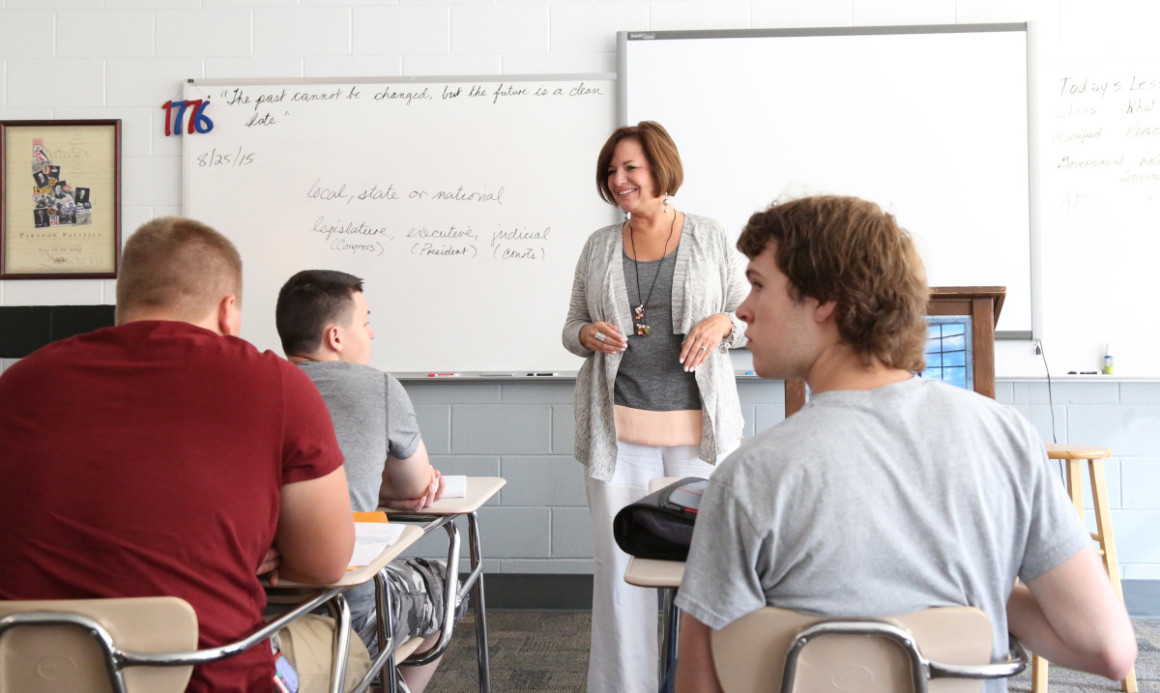Every year, Cindy Wilson shows her high school government students a one-page table that shows how Idaho carves up its general fund budget.
For her college-bound seniors, the table might show one alarming trend. Higher education’s share of the budget continues to drop — which means students will need to spend more or borrow more to pursue a degree.

For Wilson, who also serves on the state’s Board of Correction, the table illustrates another trend. The prison system continues to consume a larger share of the budget, at the expense of higher education. Consequently, she believes the state has to think carefully about the offenders it puts behind bars — and how it tries to rehabilitate and educate its inmates.
After six months on the board, the 25-year teacher is an enthusiastic advocate for what she considers the untold stories of the Idaho prison system. She’s a self-described “cheerleader” for the Idaho Correctional Industries program, which enables inmates to develop job skills. The same applies to the educators in the prison system, who teach year-round in a challenging setting.
“I get what it means to teach,” she said in a recent interview. “I hope I can help the teachers in our institutions to feel supported.”
The ‘tight fit’ between education and corrections
Wilson’s classroom at Boise’s Capital High School sets the tone for a government class. And it plays no partisan favorites. A large poster of Hillary Clinton sits a few feet from framed photographs of several prominent Idaho Republican officials — including Gov. Butch Otter, who appointed Wilson to the Board of Correction in March.
In order to pursue the appointment, Wilson had to declare a party affiliation, something she avoided through her years in teaching. She identified herself as a Democrat. (Party affiliation is a factor in Board of Correction appointments; under state law, no more than two of the board’s three members can belong to the same political party.)
Wilson is no stranger to Idaho politics, though — and she has a history of working with the executive branch. In 2013, she served on Otter’s education task force, which drew up 20 recommendations covering everything from teacher pay to classroom technology to Common Core standards.
In Idaho political circles, the task force’s recommendations are widely considered the state’s educational roadmap. Wilson says she is proud of her role, focusing on the areas of early reading, mastery-based learning and concurrent enrollment. And she says her task force role was more demanding than her current Board of Correction post.
Which isn’t to say she’s taking her new appointment lightly. She is quick to connect the dots. When students fall behind in reading, they are more likely to drop out of school — and break the law. The numbers back her up; according to state Department of Correction statistics, about 40 percent of inmates are high school dropouts, and nearly a third read below a ninth-grade level.
When someone asks Wilson why a teacher would want to serve on a corrections board, she has a ready answer. “To me, it’s such a tight fit.”
From the prisons, and back to the classroom
Unlike the state’s pardons and parole board, which hears appeals from individual inmates, the Board of Correction concentrates on policy. That takes in a broad scope: the Department of Correction, its network of 10 facilities across the state, its staff of 2,000 and jurisdiction over 24,000 convicted felons.
Wilson has spent much of the past few months seeing the system firsthand. She went to the North Idaho Correctional Institution in Cottonwood to learn more about its rider program, which provides rehabilitation programs for inmates. She attended a GED ceremony at the Idaho Correctional Institution in Orofino — an event, she said, that “brought tears to my eyes.” She spent an evening shadowing a probation and parole officer, donning a bulletproof vest for the ridealong.
“That kind of changes your wardrobe,” she said.
Wilson’s enthusiasm comes as no surprise to Correction Department Director Kevin Kempf. He knew Wilson when he was warden at the Orofino prison and she taught in the local schools, and knew what to expect. “She brings a ton of passion to the board.”
Kempf says Wilson brings a specific strength to the board: an understanding of the value of education and rehabilitation in the prisons. And she joins an administration that would like to change the storyline about its system. Violence at the state’s private prison earned the facility the nickname “Gladiator School;” in 2014, Otter announced the state would take over operations of the prison. In May, the federal government closed its investigation over falsified timecards at the private prison, declining to press charges.
Messaging isn’t a challenge unique to Idaho. In most states, prisons are trying to shake the image that they are staffed by “knuckle-dragging thugs,” Kempf said. They are struggling to get the message out that their staffers are trying to help break a cycle of crime and re-offense. “It just makes perfect sense to have Cindy as a representative of all those things.”
In the same way Wilson’s classroom experience informs her work on the board of correction, she expects her state appointment to inform her teaching.
The day she was appointed, Wilson says she got a call from Boise superintendent Don Coberly — to congratulate her, and to remind her that she has a great opportunity to bring the challenges of state government to life for her students.
That’s already part of the lesson plan. And it circles back to the state budget spreadsheet Wilson has used in class before. This year, she’ll ask her students whether they would want the state to spend more on education and rehabilitation programs in the prisons — and what programs they would cut in order to find the money.
